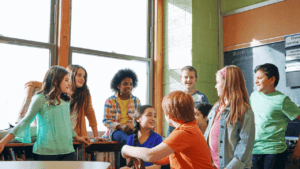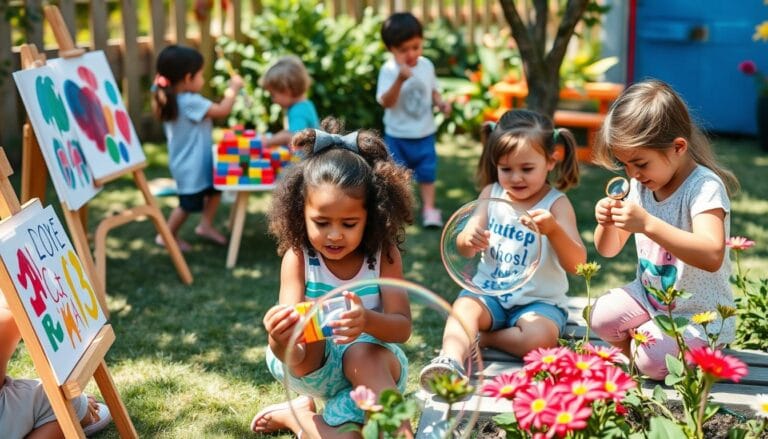
Fun Social Skills Activities for Kids to Enjoy!
Developing strong Social Skills Activities for Kids overall well-being and future success. Engaging in fun and interactive social skills activities can help kids learn to navigate social situations, communicate effectively, and build positive relationships with their peers. From games that teach turn-taking to exercises that enhance emotional recognition, there are numerous activities that can support children’s social development.
Key Takeaways:
- Social skills activities for kids are a great way to promote social development and positive relationships.
- Activities like staring contests and roll the ball help kids improve eye contact and turn-taking skills.
- Virtual playtime can enhance adaptability and problem-solving in new situations.
- Games like emotion charades aid in recognizing and managing emotions effectively.
- Engaging in social skills activities enables children to develop important life skills and be more independent.
Staring Contest for Improved Eye Contact
A staring contest is a simple yet effective social skills activity for kids that can help improve their ability to maintain eye contact during conversations. Eye contact plays a crucial role in communication and can greatly enhance interpersonal connections. By participating in a staring contest, children can focus on the task of maintaining eye contact without the pressure of simultaneous communication, making it a fun and engaging way to practice this important social skill.
If a child feels uncomfortable with direct eye contact, they can start by looking at a sticker on the other person’s forehead. This can serve as a gradual step towards having a conversation while maintaining eye contact. Encouraging children to gradually work up to maintaining eye contact without any aids can help build their confidence and develop this critical aspect of communication.
Improving eye contact through a staring contest can have a positive impact on a child’s social interactions, as it allows them to establish a stronger connection with others and demonstrate active engagement in conversations. The ability to maintain eye contact not only conveys attentiveness and interest but also signals respect and understanding.
Engaging in a staring contest is a valuable social skills activity that helps children improve their eye contact abilities, enhancing their communication skills and fostering more meaningful connections with others.
| Benefits of Staring Contest for Kids | How to Play a Staring Contest |
|---|---|
|
|
Roll the Ball for Turn-Taking Skills
Roll the Ball is a game that serves as a foundation for developing essential social skills, such as turn-taking and sharing. Suitable for young toddlers and children, this activity provides an interactive environment for learning and practicing social interactions. In Roll the Ball, participants take turns rolling a ball back and forth between them, promoting the understanding of shared experiences and cooperation.
By engaging in this game, children learn the importance of waiting for their turn and respecting others’ opportunities. It encourages them to develop self-control as they aim the ball towards their friend and roll it with an appropriate force. These actions enhance the ability to interact harmoniously with peers, laying the groundwork for successful conversations and joint activities.
Roll the Ball is a fun and interactive social skills activity that not only teaches turn-taking but also supports the development of other important communication skills. As children actively participate in this game, they learn to respect social boundaries, consider others’ needs, and engage in reciprocal interactions. Moreover, Roll the Ball serves as a valuable stepping stone, fostering positive social experiences and nurturing cooperative behaviors.
Benefits of Roll the Ball for Turn-Taking Skills:
- Promotes turn-taking and sharing
- Develops self-control and patience
- Encourages cooperation and respectful interactions
- Lays the foundation for successful conversations and group activities
| Activity | Social Skill Developed |
|---|---|
| Roll the Ball | Turn-taking and sharing |
| Conversation Game | Engaging in dialogue |
| Rhythm Games | Coordinating with others |
Engaging children in social skills activities like Roll the Ball cultivates their ability to navigate social interactions, communicate effectively, and build positive relationships. By incorporating turn-taking exercises into children’s playtime, parents and educators can create enjoyable learning environments that promote the development of crucial social skills.
Virtual Playtime for Adapting to New Situations
In today’s digital age, virtual playtime has become an excellent way for kids to engage in social skills activities, even when they can’t have in-person playdates. Whether through video chats or online spaces, children can spend quality time with their friends and participate in various activities, fostering their social development and building positive relationships.
Engaging in virtual playtime helps children adapt to new situations, such as social distancing or interacting through screens. These experiences enhance their adaptability and flexibility, crucial skills for navigating the changing world around them. They learn to embrace new technologies and platforms, which are becoming increasingly important for communication and collaboration.
Furthermore, virtual playtime encourages problem-solving abilities as children come up with creative ways to spend time together despite physical distance. They might collaborate on building virtual structures in a game or solving puzzles together online. This fosters critical thinking and teamwork, allowing them to develop effective problem-solving skills that will benefit them in various aspects of life.
Through virtual playtime, children also practice important communication skills, such as active listening and clear expression. They learn to effectively communicate their thoughts, feelings, and ideas using digital platforms. This experience is valuable in a world where online communication is becoming more prevalent.
Benefits of Virtual Playtime for Social Skills Development
Engaging in virtual playtime offers several benefits for children’s social skills development:
- Enhances adaptability and flexibility
- Boosts problem-solving abilities
- Improves communication skills
- Provides exposure to digital platforms
| Benefits | Description |
|---|---|
| Enhances adaptability and flexibility | Virtual playtime helps children adapt to new situations and environments, such as social distancing or interacting through screens. They learn to navigate digital platforms and embrace new technologies, fostering their adaptability and flexibility. |
| Boosts problem-solving abilities | Engaging in virtual playtime requires children to find creative solutions to interact and play with their friends despite physical distance. This cultivates their problem-solving skills and encourages them to think critically and innovatively. |
| Improves communication skills | Through virtual playtime, children practice important communication skills, such as active listening and clear expression. They learn to effectively communicate their thoughts, feelings, and ideas using digital platforms, preparing them for online communication in various contexts. |
| Provides exposure to digital platforms | Virtual playtime exposes children to different digital platforms and technologies, helping them become familiar with online communication and collaboration. This exposure enhances their digital literacy and prepares them for future interactions in the digital world. |
Overall, virtual playtime offers a valuable opportunity for children to develop social skills, adapt to new situations, and build positive relationships. It provides a bridge between physical and digital interactions, equipping children with the skills they need to thrive in today’s rapidly evolving world.
Emotion Charades for Emotional Recognition and Management
Emotion charades is an engaging social skills activity for kids that promotes emotional recognition and management. In this game, children choose an emotion from a hat or bucket and act it out for others to guess. By mimicking facial expressions and body language, children learn to recognize and identify different emotions in themselves and others.
This activity provides a safe and playful environment for children to express and manage their own emotions. Through role-playing and acting, they develop their emotional intelligence and gain a better understanding of how emotions can be effectively communicated.
By participating in emotion charades and similar social skills activities, children enhance their ability to navigate social interactions and build positive relationships. They learn to empathize with others’ feelings and respond appropriately in different situations. This game encourages children to become more emotionally aware and responsive, fostering healthier communication and deeper connections.
Benefits of Emotion Charades:
- Improves emotional recognition skills
- Enhances non-verbal communication abilities
- Develops empathy and understanding of others’ emotions
- Promotes emotional self-expression and management
- Fosters positive social interactions and relationships
By actively engaging in emotion charades, children gain a valuable set of social and emotional skills that can support their personal growth and interactions with others. These skills are essential for building strong and meaningful relationships throughout their lives.
Conclusion
Engaging in Social Skills Activities for Kids is a fun and effective way for kids to develop essential social skills and promote their social development. By participating in various games and interactive exercises, children have the opportunity to learn important social behaviors and understand how their actions can impact others.
These activities provide a platform for children to enhance their communication skills, improve their turn-taking abilities, and learn to recognize and manage their own emotions. Through these experiences, children become more independent and develop the necessary skills to build positive relationships throughout their lives.
By fostering positive social development, social skills activities play a significant role in helping children develop the foundations for successful communication and emotional growth. These activities create a supportive environment for children to learn and practice important social skills, enabling them to navigate social situations and build strong, positive relationships in the future.
FAQ
What are social skills activities for kids?
Social skills activities for kids are interactive games and exercises that help children develop important social skills such as communication, turn-taking, and emotional intelligence. These activities promote positive relationships and social development.
How can a staring contest improve eye contact?
A staring contest is a fun game that helps children improve their ability to maintain eye contact during conversations. By focusing on maintaining eye contact without the pressure of simultaneous communication, children can develop their eye contact skills, an essential aspect of effective communication.
How does Roll the Ball help in developing turn-taking skills?
Roll the Ball is a game that teaches young children the basics of taking turns and sharing. By engaging in this activity, children develop their social skills by learning turn-taking and sharing behaviors, as well as self-control in aiming and rolling the ball appropriately.
How can virtual playtime help kids adapt to new situations?
Virtual playtime, through video chats and online spaces, provides opportunities for children to interact and engage in various activities. It helps them adapt to new situations such as social distancing or interacting through screens, which are valuable skills in today’s digital age. Engaging in virtual playtime also enhances problem-solving abilities as children find creative ways to connect despite physical distance.
How can emotion charades improve emotional recognition and management?
Emotion charades is a game where children act out different emotions for others to guess. By participating in this activity, children learn to recognize emotions using facial and body cues. It also allows them to practice expressing and managing their own emotions in a safe and playful context, thus enhancing their emotion recognition and management skills.













